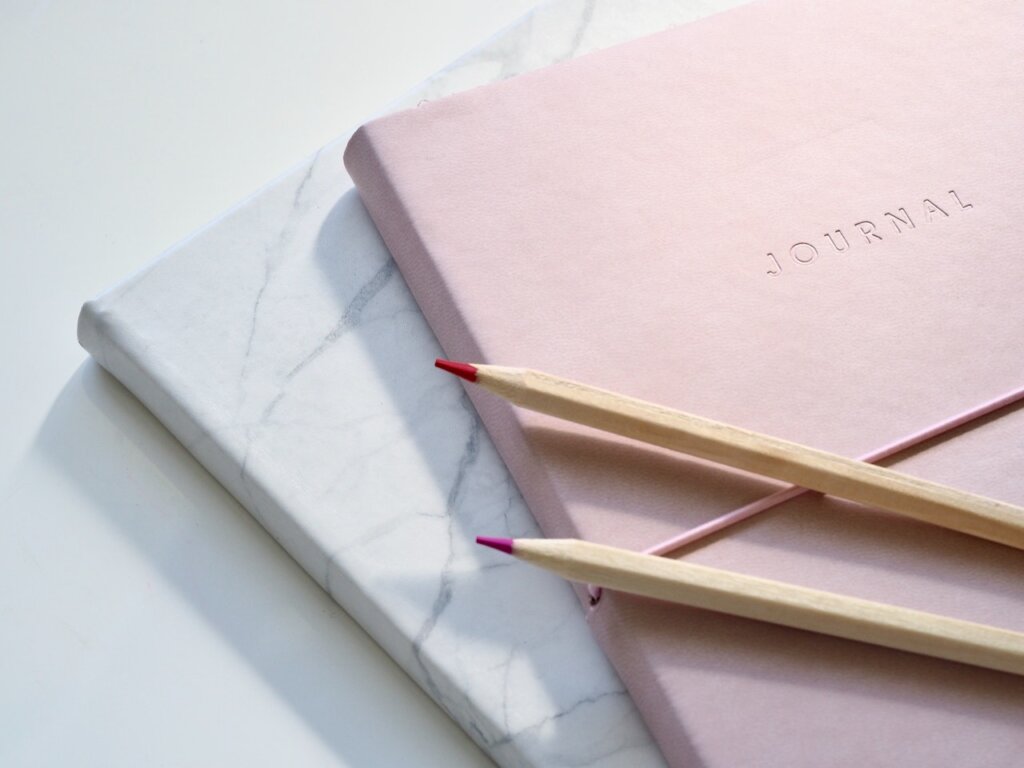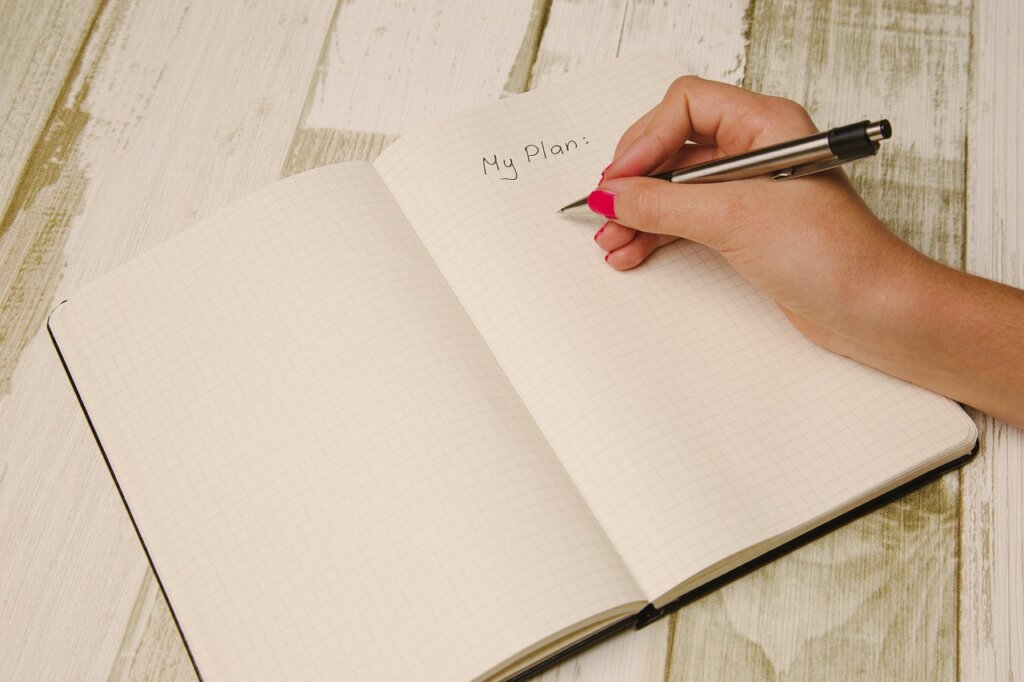Journaling is a profoundly helpful journey that allows individuals to reflect, process, and grow.
But you might be wondering to yourself, ‘How do you start an introduction for a journal entry?’
Nothing helps get your creative juices flowing like a compelling journal introduction!
Whether you’re just starting out or have been doing this for years, here are 34 tailored journal introduction ideas to suit every level of expertise.

1. Dear Future Self
Begin your journal with a heartfelt letter to your future self. Share your hopes, dreams, and goals. Reflect on where you are now and where you hope to be when you revisit these words.
This introspective approach sets a positive and forward-looking tone for your journaling experience.
2. Mindful Moment Snapshot
Describe a moment from your day that encapsulates your feelings, surroundings, and emotions. It could be as simple as the sun setting over the horizon or the aroma of your morning coffee.
By capturing these moments, you’re inviting your future self to step back into that specific point in time.
3. Quotes That Inspire
Start with a quote that resonates with you. It could be from a favorite author, philosopher, or even a line from a song. Explain why this particular quote speaks to you and how it sets the stage for your journaling journey.
How about a whole collection of quantity over quality quotes!
4. A Visual Collage
If words aren’t your primary mode of expression, or maybe you’d just like to flex your creativity, consider creating a visual introduction.
Cut out images, draw, or even use stickers and create a collage that represents your current state of mind, interests, and aspirations.
This visual prompt can be a powerful way to kickstart your journaling experience.

5. Gratitude Page
Begin with a list of things you’re grateful for. This positive start not only sets a hopeful tone but also reminds you of the abundance in your life.
It could be as grand as achieving a milestone or as simple as a smile from a stranger on the street.
6. Unsent Letters
Write a series of unsent letters to people or things in your life. Pour out your unspoken thoughts, feelings, and emotions.
This exercise can be incredibly therapeutic and provide a powerful release.
7. Five-Year Time Capsule
Imagine you’re writing a letter to yourself five years from now. What do you hope to have accomplished? What challenges do you anticipate?
This exercise encourages introspection and long-term thinking.

8. Setting Your Intentions
List out your intentions for this journal. What do you hope to achieve through this practice? Is it for self-discovery, creativity, or to track a specific goal?
Setting clear intentions from the start gives your journaling journey purpose.
9. A Poem or Short Story
If you’re inclined towards creative writing, start with a poem or a short story that encapsulates your current state of mind.
This sets a vivid scene for the rest of your journal.
10. Bucket List
Begin with a list of things you want to experience or achieve in your lifetime. This not only helps you clarify your goals but also serves as a source of inspiration for future entries.
11. The Anecdotal Opener
Begin your journal entry with a compelling anecdote that sets the tone for your content. Anecdotes provide a personal touch, creating a more connected and engaged feel.
For instance, if you’re writing about travel, start with a vivid experience from your recent journey, and smoothly transition into the main topic.
Example: “As the sun dipped below the horizon, casting a warm, golden hue over the cobblestone streets of Paris, I couldn’t help but be swept away by the magic of this city…”

12. The Provocative Question
Pique your own curiosity by posing a thought-provoking question. This prompt invites reflection on the topic at hand and creates an immediate sense of engagement.
Example: “Have you ever wondered why some people seem to effortlessly achieve their goals while others struggle to make progress?”
13. The Surprising Statistic
Presenting a surprising or little-known statistic can provide a beginning foundation for your chosen subject.
Example: “Did you know that over 70% of people admit to feeling stressed on a daily basis?”
14. The Storyteller’s Approach
Like to journal in story form? Tell a brief, captivating story related to your journal topic (can be fiction or fact). This narrative approach creates context and emotional resonance, providing a unique connection with your entry.
Example: “Once upon a time in a quaint little village, there lived an old man known for his peculiar habit of collecting abandoned books…”
15. Travel Through Time
Begin a journal entry from a different time period or imagine yourself in the future. This imaginative exercise can offer unique perspectives and insights.
16. Soundtrack of Your Life
Compile a playlist of songs that resonate with your current state of mind. Write about why each song holds significance for you at this moment.

17. Stream of Consciousness
Allow your thoughts to flow freely without any specific structure or direction. This unfiltered approach can lead to surprising revelations and deeper self-awareness.
18. Dialogue with an Emotion
Personify an emotion and engage in a dialogue with it. Explore its origins, impact, and potential lessons it holds for you.
19. Dialogue with Your Past Self
Imagine having a conversation with a version of yourself from the past. Reflect on the advice you would give, the lessons you’ve learned, and the growth you’ve experienced.
20. A Dialogue with a Role Model
Engage in a written conversation with someone you look up to. Discuss the qualities and values you admire in them and how you aspire to embody them in your own life.
21. A Blueprint for Growth
Create a visual or written plan outlining the areas of your life you want to focus on for personal development and growth. Detail the steps you intend to take.

22. A Letter to Your Inner Critic
Address the inner critic that sometimes holds you back. Write a letter acknowledging its presence and setting an intention to move forward with confidence.
23. Embracing Your Inner Hero/Heroine
Imagine yourself as the protagonist of a heroic journey. Write about the challenges you’ll face, the allies you’ll meet, and the ultimate goal you’re striving for.

24. A Snapshot from Your Childhood
Recall a vivid memory from your childhood and reflect on how it shaped you into the person you are today.
25. Mapping Your Personal Values
List your core values and explain why each one is important to you. Reflect on how these values guide your decisions and actions.
26. A Day in the Life of Your Ideal Future
Write a journal entry from the perspective of a day in your future where you’re living your ideal life. Describe the details and emotions of that day.
27. A Letter to Your Inner Child
Write a compassionate letter to your younger self, offering love, support, and encouragement.
28. A Letter to Your Fear
Address your fears, acknowledging their presence and exploring ways to overcome or work with them.
29. The Legacy You Want to Leave Behind
Write about the impact you hope to have on the world and the legacy you want to leave for future generations.
30. A Conversation with a Fictional Character
Engage in a written dialogue with a fictional character from a book, movie, or story that resonates with you. Discuss the lessons and qualities you admire in them.
31. A Snapshot of Your Ideal Sanctuary
Describe your dream sanctuary—a place where you feel completely at peace and content. Detail the sights, sounds, and feelings associated with this sacred space.

32. A Catalog of Your Superpowers
Identify your unique strengths, talents, and abilities. Imagine them as superpowers and discuss how you can use them to navigate through life.
33. A Tour of Your Dream House
Sketch or describe the layout and features of your dream home. Reflect on why these aspects hold significance for you.

34. The Ingredients of Your Perfect Day
List or describe the elements that would constitute your ideal day. This exercise helps you envision and work towards creating fulfilling experiences.
Conclusion
Remember, your journal introduction is a reflection of you in this moment. It’s a personal space where you can be completely authentic and free.
Choose a journal introduction idea that resonates with you and sets the tone for the journaling adventure that lies ahead.
Happy journaling!
Any journaling introduction ideas that have worked for you? Tell me all about it in the comments below!
Digging this journaling thing? Here’s an article on journaling ideas for beginners!
Until next time, stay cozy my friends.





